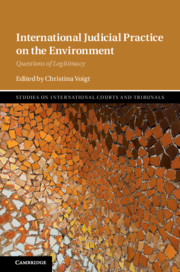Book contents
- Reviews
- International Judicial Practice on the Environment
- Studies on International Courts and Tribunals
- International Judicial Practice on the Environment
- Copyright page
- Contents
- Contributors
- Acknowledgements
- Table of Cases
- Introduction International Courts and the Environment: the Quest for Legitimacy
- Part I Procedural Legitimacy of Judicial Environmental Practice: Access to Justice
- 1 The Environment before the European Court of Justice
- 2 The EU Aarhus Regulation and EU Administrative Acts Based on the Aarhus Regulation: the Withdrawal of the CJEU from the Aarhus Convention
- 3 Access to Justice before EU Courts in Environmental Cases against the Backdrop of the Aarhus Convention: Balancing Pathological Stubbornness and Cognitive Dissonance?
- Part II Legitimacy and Scientific Certainty: Environmental Adjudication, Use of Experts and the Limits of Science
- Part III Judges as Law-Makers: Legitimate Development of Environmental Law
- Part IV Legitimacy of Outcomes: Performance, Effects (and Side-Effects)
- Part V The Legitimacy of Non-Compliance Procedures
- Part VI The Limits of Environmental Justice through Courts: Balancing Legitimacy with the Need for Creativity
- Index
3 - Access to Justice before EU Courts in Environmental Cases against the Backdrop of the Aarhus Convention: Balancing Pathological Stubbornness and Cognitive Dissonance?
from Part I - Procedural Legitimacy of Judicial Environmental Practice: Access to Justice
Published online by Cambridge University Press: 15 April 2019
- Reviews
- International Judicial Practice on the Environment
- Studies on International Courts and Tribunals
- International Judicial Practice on the Environment
- Copyright page
- Contents
- Contributors
- Acknowledgements
- Table of Cases
- Introduction International Courts and the Environment: the Quest for Legitimacy
- Part I Procedural Legitimacy of Judicial Environmental Practice: Access to Justice
- 1 The Environment before the European Court of Justice
- 2 The EU Aarhus Regulation and EU Administrative Acts Based on the Aarhus Regulation: the Withdrawal of the CJEU from the Aarhus Convention
- 3 Access to Justice before EU Courts in Environmental Cases against the Backdrop of the Aarhus Convention: Balancing Pathological Stubbornness and Cognitive Dissonance?
- Part II Legitimacy and Scientific Certainty: Environmental Adjudication, Use of Experts and the Limits of Science
- Part III Judges as Law-Makers: Legitimate Development of Environmental Law
- Part IV Legitimacy of Outcomes: Performance, Effects (and Side-Effects)
- Part V The Legitimacy of Non-Compliance Procedures
- Part VI The Limits of Environmental Justice through Courts: Balancing Legitimacy with the Need for Creativity
- Index
Summary
- Type
- Chapter
- Information
- International Judicial Practice on the EnvironmentQuestions of Legitimacy, pp. 74 - 118Publisher: Cambridge University PressPrint publication year: 2019



